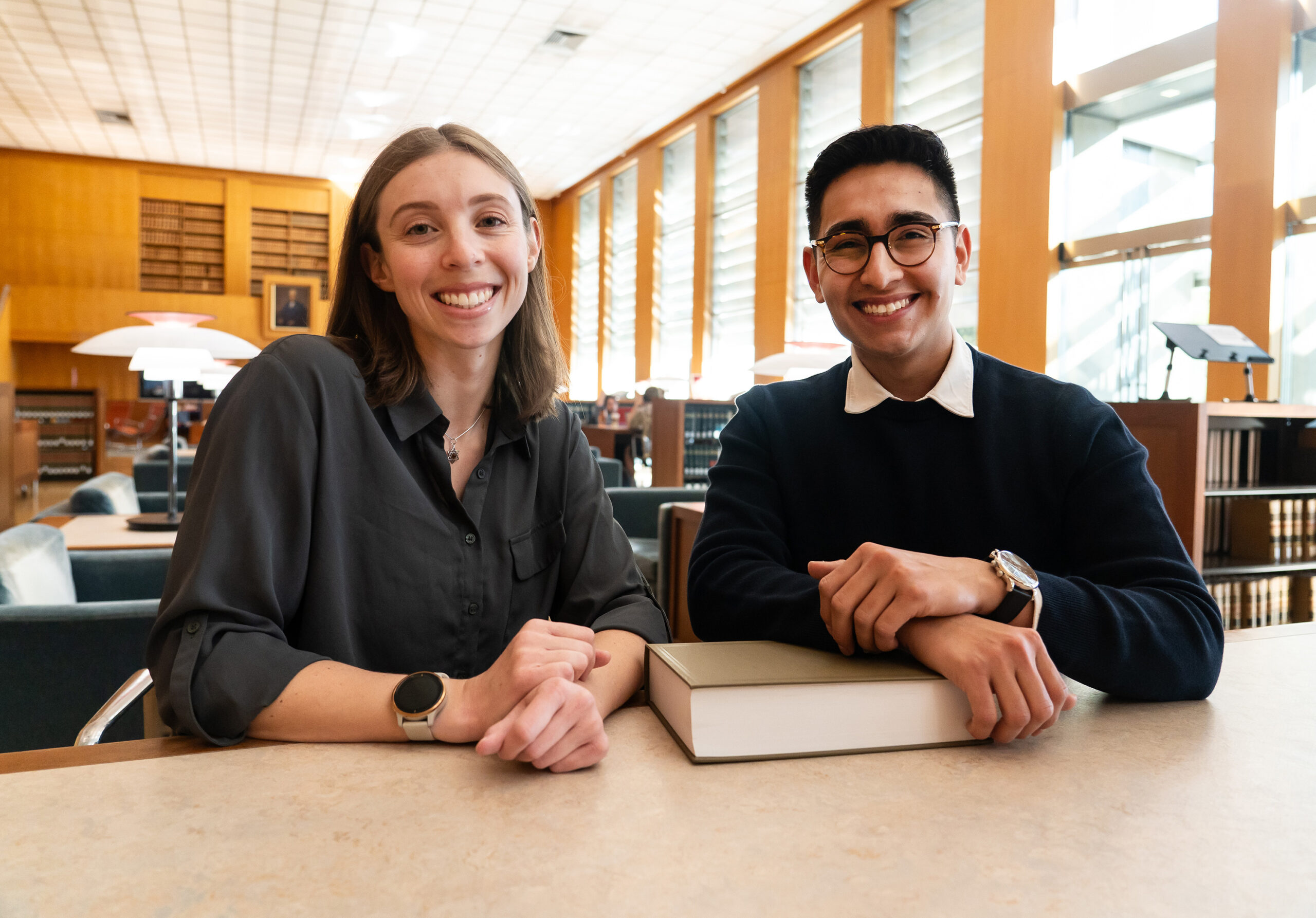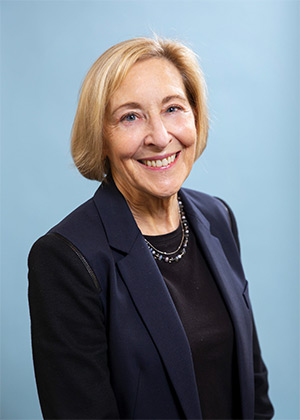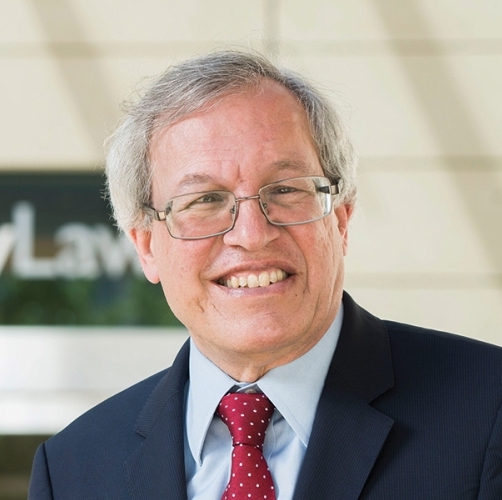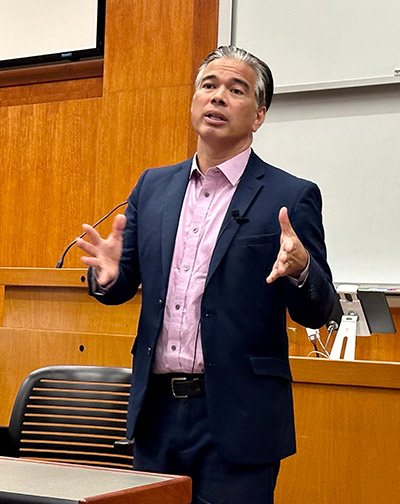
By Andrew Cohen
Two students in UC Berkeley Law’s Death Penalty Clinic played pivotal roles in an amicus brief for OSPD v. Bonta, recently filed with the California Supreme Court, which argues that California’s death penalty laws have been applied in a racially discriminatory manner violating the state constitution’s equal protection guarantee.

3Ls Niki Kates and Robin Martinez worked tirelessly on the brief, submitted on behalf of the Office of the State Public Defender (OSPD) and other petitioners by Professor Elisabeth Semel, the clinic’s co-director. Dean Erwin Chemerinsky is co-counsel on the brief, with Professors Khiara M. Bridges and Ian Haney López and other legal scholars as the amici (friends of the court).
“So much of Niki’s and Robin’s work was impressive,” Semel says of their research and writing. “But I especially recall several times during our many meetings pausing at a suggestion one or the other raised that struck me as exquisitely insightful.”
Kates researched how the California Supreme Court’s record of state constitutionalism — and leadership in that approach — is fundamental to America’s system of federalism. Her research demonstrated the importance of state constitutional independence over the last 75 years, especially within criminal law and criminal procedure.
Martinez delved into the historical section, highlighting California’s deep record of racial and ethnic discrimination in administering capital punishment. With no sound empirical studies of capital punishment before the early 1970s, he surfaced robust content from before that time — including legislative reports, hearing transcripts, law review articles, and news coverage.
Chief Deputy State Public Defender Christina Spaulding ’88 says the brief “added an extraordinarily valuable scholarly perspective on the history of racial discrimination in California, including in the administration of the death penalty, and the California Supreme Court’s history of interpreting the state constitution to afford broader protections against discrimination than the federal Constitution.” She adds, “The caliber of scholars from California law schools who joined the brief, including Professors Bridges and Haney López from Berkeley, attests to its strength.”
Extensive evidence
The brief also includes results from a comprehensive empirical analysis the clinic conducted in San Diego County on behalf of their death-sentenced client La Twon Weaver. One of 15 studies spanning 44 years the petitioners used as evidence, it was the first county-level California death penalty study to collect and analyze extensive data over a vast time frame.
It found that between 1978 and 1993, the odds the District Attorney would charge special circumstances — necessary to seek the death penalty — were 3.7 times higher in cases involving Black defendants and White victims than in cases with non-White victims. The odds of the death penalty being sought was 6.5 times higher in cases in which the defendants were Black and the victims were White than in cases with Black or Latinx victims.

OSPD also referenced some of the clinic’s other empirically-based litigation, including challenges to death qualification as a racially discriminatory procedure in four California counties, a previous clinic amicus brief highlighting the history of California’s death penalty as a racially biased system, and the clinic’s Whitewashing the Jury Box report. That study showed the connection between racial discrimination in death qualification and the exercise of peremptory jury challenges.
Noting consistent patterns of results across numerous studies with different approaches, Semel says, “When it comes to extra-legal and legal executions, the roots of racism are sunk deep in California soil.”
In addition to Kates and Martinez, 3Ls Alizeh Hussain, Sara Flinn, and Ian Feather helped proofread and cite-check as the filing deadline neared, paralegal Steph Shattuck was the production engine for the brief, and UC Berkeley Law library staff provided often obscure materials.
“This filing exemplifies the concept of ‘team defense,’ which is our model in the clinic,” Semel says.
Historical roots
Martinez’s research showed how the history of racism and racial terror in California is indispensable as the court considers how the state’s death penalty, and the disparities that persist within executions, came to be.
He says death has been an authorized state response to alleged crime since the Gold Rush era, but underlines in his research that the killing and subjugation of people of color in California began well before then with an extermination campaign waged against the Indigenous population by early colonizers, including those panning for gold and the U.S. government.
Native people were arrested for petty criminal infractions and sold at auction in Los Angeles, Martinez adds, and enslaved people were brought from the South to toil along riverbeds and mountainsides for gold — some unaware they were legally free once within the state.
“When it comes to executions in California before 1970, data on state-sanctioned sentences and documented extrajudicial lynchings tend to show that Black and Brown people were more likely to be executed than their White counterparts despite representing a small fraction of the population,” he says. “This cannot be decoupled from California’s deep history of racism.”
Between the late 19th and mid-20th century, racial terror gripped many places in California and racial disparities in executions remained manifest. Martinez points out that vigilantism and extrajudicial lynchings in response to allegations of crime were also rampant and that between 1850 and 1927, 352 documented lynchings occurred in the state. In 1871, Martinez reports, a Los Angeles mob lynched 17 Chinese men and boys because the mob believed that Chinese people had killed a White saloon owner.
“This trend of disproportionately targeting people of color for executions in response to alleged crime extended to judicially-imposed death sentences,” Martinez says. “Over half of those executed by the San Francisco sheriff between 1850 and 1890 were people of color, and between 1938 and 1963 Black Californians accounted for 22% of the state’s executions despite representing less than 6% of the population.
“The historical record bears out a clear and consistent conclusion: Until its temporary halt in application in the early 1970s, executions in California — judicially imposed or otherwise — were often a vehicle for discriminatory racial violence. And this state’s history of executions cannot be disentangled from California’s broader history of persistent racial violence.”
Constitutional connection
The clinic also addressed an area it had not fully explored before: the California Supreme Court’s history of grounding fundamental rights in the state constitution, rather than in the U.S. Constitution. The petitioners claim that the court is not bound by McCleksey v. Kemp — a 1987 U.S. Supreme Court decision upholding a death sentence and stating that the racial disparity in Georgia’s death penalty system did not itself violate the federal Constitution — if it considers the application of capital punishment under the state constitution’s equal protection guarantee.
The state independent grounds doctrine essentially protects state court decisions from federal review by basing the reasoning in state constitutional law, over which federal courts lack jurisdiction. While much public discourse about states exercising constitutional autonomy focuses on conservative state actions, Kates found it is also used to advance civil rights.

“Particularly on the West Coast, there’s a very robust tradition of relying on state constitutions to increase protections for vulnerable populations,” she says. “The California Supreme Court has long held itself to a more protective standard than federal courts, especially when it comes to issues like equal protection and due process. What this means is the court has often been ahead of the national curve on issues like school desegregation, marriage equality, interracial marriage, and racial bias in jury selection, to name a few.”
Kates notes some federal courts might reject the data submitted in the case, comprehensive as it is, because of the McCleskey ruling — which holds that intentional discrimination against a specific defendant is required to invalidate a death sentence on anti-discrimination grounds.
Washington, Connecticut, and Massachusetts have applied their state constitutions to bar capital punishment based on evidence less robust than the studies presented in OSPD v. Bonta, Kates explains.
“Morally, referencing other states helps show the court that this is a just path for California to continue its history of being ahead of the curve, particularly regarding discrimination,” she says. “The message is this: When you look at important rights and protections over the past century, California has been the first or one of the first. Shouldn’t we add the death penalty to that list, too?”
Semel says California Attorney General Rob Bonta has publicly acknowledged, as a general matter, that studies show the death penalty has long had a disparate impact on defendants of color — especially when the victim is white — and in the AG’s initial pleading agreed the court should hear the petition and appoint a special master to oversee the presentation of evidence.
“Historically, the California Supreme Court has had the courage to apply independent state constitutional provisions to ensure that Californians’ fundamental rights are protected when the federal court fails to do so,” Semel says. “The question is whether the court will meet the challenge to act on the strength of the facts and the law.”